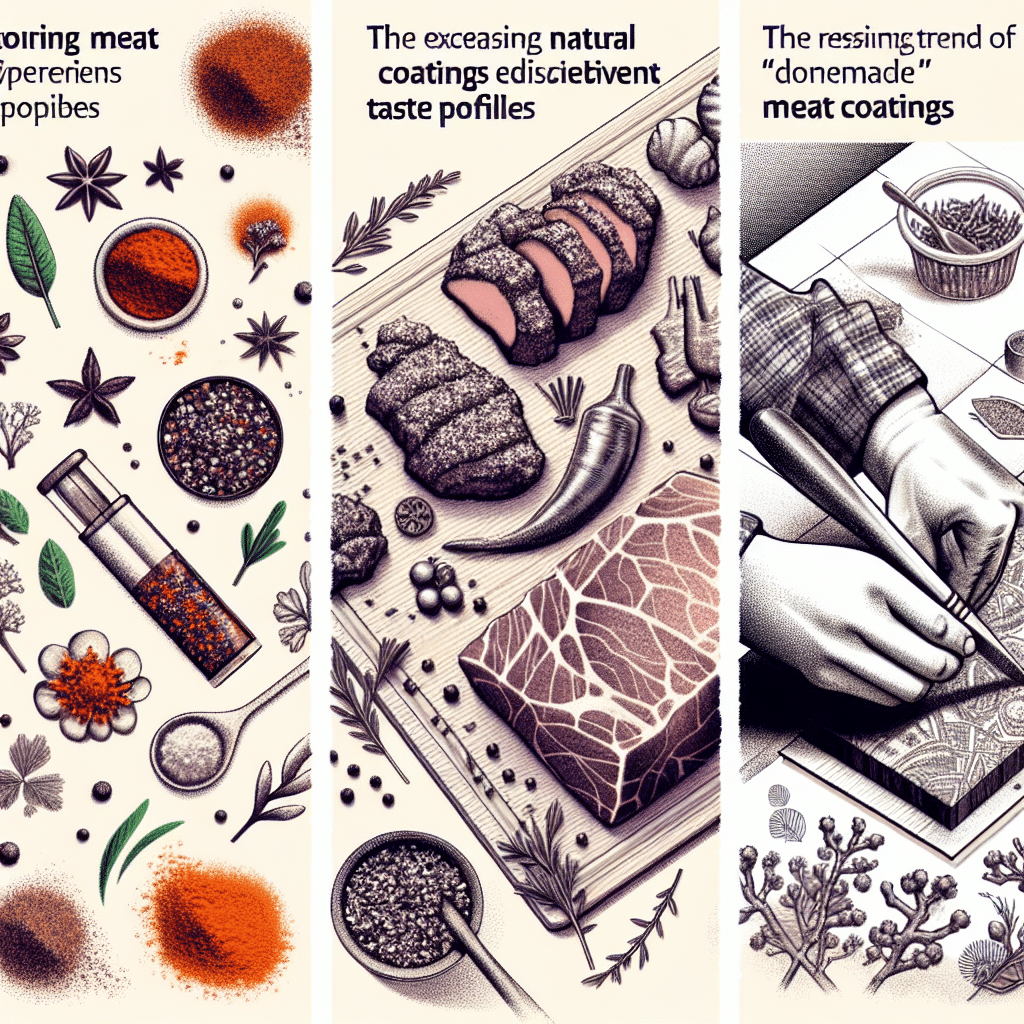3 Key Trends in the Meat Coatings Market
-
Table of Contents
Meat Coatings Market: 3 Key Trends Shaping the Industry

The meat coatings market is evolving rapidly, driven by changing consumer preferences, technological advancements, and the pursuit of healthier and more sustainable food options. As the demand for meat products continues to grow globally, the industry is responding with innovative solutions to enhance flavor, texture, and nutritional value. In this article, we will explore three key trends that are currently shaping the meat coatings market, providing insights into how these trends are influencing product development and consumer choices.
1. The Rise of Plant-Based and Clean Label Coatings
One of the most significant trends in the meat coatings market is the shift towards plant-based and clean label ingredients. Consumers are increasingly seeking out products that are not only delicious but also made with natural and recognizable ingredients. This has led to the development of meat coatings that are free from artificial additives, preservatives, and allergens.
- Plant-Based Coatings: With the growing popularity of plant-based diets, there is a rising demand for meat coatings that align with vegan and vegetarian lifestyles. Innovations in this area include coatings made from legumes, nuts, and seeds, which offer a crunchy texture and are rich in protein.
- Clean Label Coatings: Clean label products are those that contain simple, minimally processed ingredients. Meat coatings with a clean label often feature spices, herbs, and other natural seasonings that provide flavor without the need for synthetic additives.
Case studies from leading food companies show that plant-based and clean label coatings are not only appealing to health-conscious consumers but also to those interested in environmental sustainability. By using ingredients that have a lower environmental footprint, these coatings contribute to a more sustainable food system.
2. Technological Innovations in Coating Applications
Advancements in technology are revolutionizing the way meat coatings are applied, leading to improved efficiency, consistency, and product quality. Automated coating systems and novel application methods are becoming more prevalent in the industry.
- Automated Coating Systems: Automation in meat coating processes ensures uniform application, reduces waste, and increases production speeds. These systems can be programmed to apply various types of coatings, from breadcrumbs to glazes, with precision.
- Novel Application Methods: Innovative application techniques such as electrostatic coating and airbrushing are being developed to enhance the adhesion of coatings to meat products. These methods help in achieving an even distribution of coatings, which is crucial for both the cooking process and the final taste and texture of the product.
Statistics indicate that the adoption of these technologies can lead to significant cost savings for manufacturers, as well as a reduction in labor requirements. Moreover, the consistency and quality improvements associated with technological innovations are likely to drive consumer satisfaction and brand loyalty.
3. Functional and Nutritional Enhancements
Another trend that is gaining momentum in the meat coatings market is the incorporation of functional and nutritional enhancements. As consumers become more health-conscious, they are looking for meat products that not only taste good but also offer additional health benefits.
- Protein-Enriched Coatings: High-protein diets are popular among health enthusiasts and those looking to manage their weight. Meat coatings that are enriched with additional protein sources, such as whey or plant proteins, are becoming more common.
- Fortified Coatings: Coatings that are fortified with vitamins, minerals, and other nutrients can help to address dietary deficiencies and support overall health. For example, coatings with added fiber can aid in digestion, while those with omega-3 fatty acids can support heart health.
Examples of these functional coatings can be found in products targeting specific consumer segments, such as athletes or individuals with specific dietary needs. By offering enhanced nutritional value, these coatings can differentiate products in a crowded market and appeal to consumers looking for more than just flavor.
Conclusion
The meat coatings market is undergoing significant changes, with plant-based and clean label coatings, technological innovations in application methods, and functional and nutritional enhancements leading the way. These trends reflect a broader shift towards healthier, more sustainable, and technologically advanced food production practices. As the industry continues to evolve, we can expect to see further innovations that cater to the diverse and changing needs of consumers around the world.
ETprotein: Your Source for High-Quality Protein Products
In line with the trend towards functional and nutritional enhancements in meat coatings, ETprotein offers a range of high-quality protein products that can be used to enrich meat coatings with additional health benefits. Their organic bulk vegan proteins, including rice protein, pea protein, and various seed proteins, are ideal for creating protein-enriched coatings that cater to health-conscious consumers.
ETprotein’s products are characterized by a neutral taste, non-GMO, allergen-free attributes, and high purity levels, making them suitable for a variety of applications in the meat coatings market. Whether you are looking to develop a new coating product or enhance an existing one, ETprotein can provide the ingredients you need to meet the demands of today’s consumers.
About ETprotein:
ETprotein, a reputable protein and L-(+)-Ergothioneine (EGT) Chinese factory manufacturer and supplier, is renowned for producing, stocking, exporting, and delivering the highest quality organic bulk vegan proteins and L-(+)-Ergothioneine. They include Organic rice protein, clear rice protein, pea protein, clear pea protein, watermelon seed protein, pumpkin seed protein, sunflower seed protein, mung bean protein, peanut protein, and L-(+)-Ergothioneine EGT Pharmaceutical grade, L-(+)-Ergothioneine EGT food grade, L-(+)-Ergothioneine EGT cosmetic grade, L-(+)-Ergothioneine EGT reference grade and L-(+)-Ergothioneine EGT standard. Their offerings, characterized by a neutral taste, non-GMO, allergen-free attributes, with L-(+)-Ergothioneine purity over 98%, 99%, cater to a diverse range of industries. They serve nutraceutical, pharmaceutical, cosmeceutical, veterinary, as well as food and beverage finished product distributors, traders, and manufacturers across Europe, USA, Canada, Australia, Thailand, Japan, Korea, Brazil, and Chile, among others.
ETprotein specialization includes exporting and delivering tailor-made protein powder and finished nutritional supplements. Their extensive product range covers sectors like Food and Beverage, Sports Nutrition, Weight Management, Dietary Supplements, Health and Wellness Products, and Infant Formula, ensuring comprehensive solutions to meet all your protein needs.
As a trusted company by leading global food and beverage brands and Fortune 500 companies, ETprotein reinforces China’s reputation in the global arena. For more information or to sample their products, please contact them and email sales(at)ETprotein.com today.














